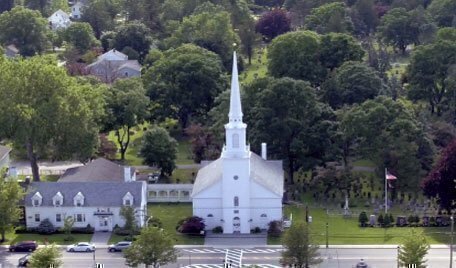When can public funds be used to preserve historic buildings, if the structures also happen to be churches? A case from New Jersey could settle an apparent split among different courts involving the First Amendment and grants related to houses of worship.
 In Morris County Board of Chosen Freeholders v. Freedom from Religion Foundation, the New Jersey county government officials argue that an annual historic preservation grant program should include churches if they meet certain national and state guidelines to qualify as historic buildings. The Freedom from Religion Foundation believes including churches in the program clearly violates the First Amendment because the county grant program actually favors religious institutions in its policies and the state's constitution forbids public funding for religious uses.
In Morris County Board of Chosen Freeholders v. Freedom from Religion Foundation, the New Jersey county government officials argue that an annual historic preservation grant program should include churches if they meet certain national and state guidelines to qualify as historic buildings. The Freedom from Religion Foundation believes including churches in the program clearly violates the First Amendment because the county grant program actually favors religious institutions in its policies and the state's constitution forbids public funding for religious uses.
In September 2018, the county asked the United States Supreme Court to consider its appeal after the New Jersey Supreme Court ruled that the grant program violated the Religious Aide Clause included in New Jersey's constitution back in 1776. New Jersey Chief Justice Stuart Rabner said the conflict between Morris County and the Freedom from Religion Foundation differed from the United States Supreme Court's Trinity Lutheran decision. In 2017, Chief Justice John Roberts said in a 7-2 majority decision in Trinity Lutheran that under the Constitution's Free Exercise Clause, a church could not be excluded from Missouri's playground resurfacing program just because of its religious character.
Rabner said the Trinity Lutheran decision didn't settle an open question about the use of public funds received by churches if those funds were used to directly facilitate religious services. "The [Morris County] Churches are not being denied grant funds because they are religious institutions; they are being denied public funds because of what they plan to do—and in many cases have done: use public funds to repair church buildings so that religious worship services can be held there. Those grants constitute an impermissible religious use of public funds," Rabner concluded, citing a conflict with the state's Religious Aide Clause.
The Becket Fund for Religious Liberty, representing Morris County, is asking the Supreme Court to consider two questions. The first is if Chief Justice Roberts and the majority in the Trinity Lutheran decision meant to say that public funds can't be used to fix a historic church because the spending would support a "religious use." Eric Baxter, the Becket Fund lead attorney, claims the Court in Trinity never got to that question, and now three state Supreme Courts and a federal district court are equally divided on the answer.
The second broader question is if "the categorical exclusion of all active houses of worship from historic preservation grants violates Trinity Lutheran and the First Amendment as an exclusion based on religious status." Baxter says such a "categorical exclusion of houses of worship from historic preservation funding" clearly goes against Trinity Lutheran and the Supreme Court could also overrule the New Jersey court without hearing arguments.
UCLA scholar Erwin Chemerinsky, representing the Freedom from Religion Foundation, disagrees and says the real question is if "it violates free exercise of religion under the First Amendment to the United States Constitution for a state, pursuant to an explicit provision of its state constitution, to deny funds to churches to repair or restore their use for religious worship."
Chemerinsky argues the county historic preservation grant program is not inclusive of all historic buildings. "Put more simply, this dedicated tax is distributed only to the government, charities dedicated to historic preservation, and churches. Individuals, for-profit businesses, and most secular nonprofits are excluded from the County’s program even if they own and maintain historic buildings," he says in a brief to the Supreme Court. "In other words, key to this case is the undisputed fact that the County’s program favors religious institutions over non-religious ones."
The importance of New Jersey's state constitution is another important factor, Chemerinsky says. "New Jersey’s long-standing choice in its constitution to not provide funding of churches thus should be upheld based on history and based on the recognition since the earliest days of the nation that it is wrong to tax people to support the churches of others," he concludes.
In a counter brief, Baxter says the county's program never excluded secular non-profits from receiving historic preservation grants. "Respondents argue as if Morris County’s historic preservation program favored religious sites and excluded the secular. Far from it. Before the New Jersey Supreme Court barred churches with active congregations, all nonprofits could participate," Baxter writes.
For now, the Supreme Court has had the Morris County case under review at three private conferences and it could take action on the case as soon as today, or possibly next Tuesday. However, in a separate court filing, Baxter notes that state Supreme Court decisions in New Mexico and Montana last December related to Trinity Lutheran have deepened the split among the lower courts on the religious use question.
Scott Bomboy is the editor in chief of the National Constitution Center.







